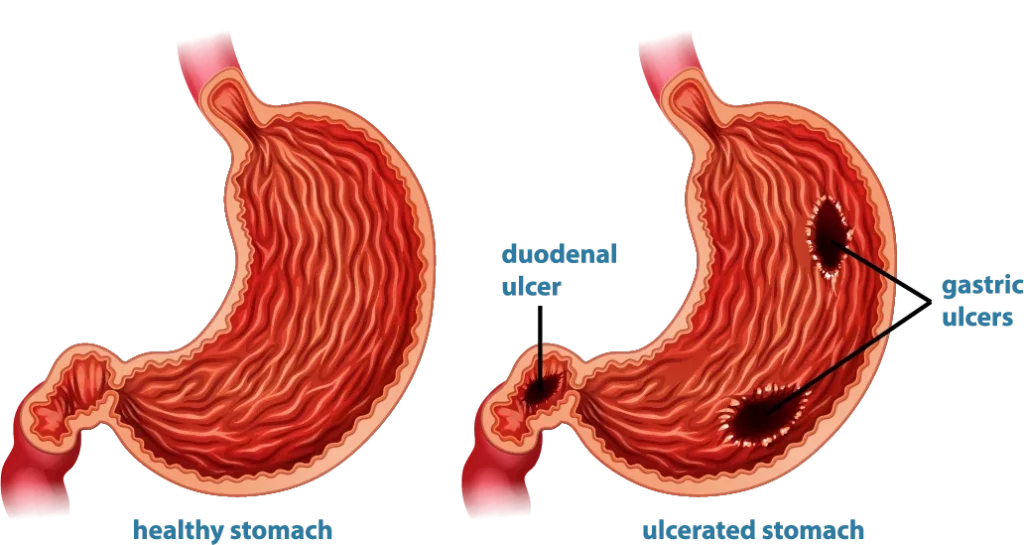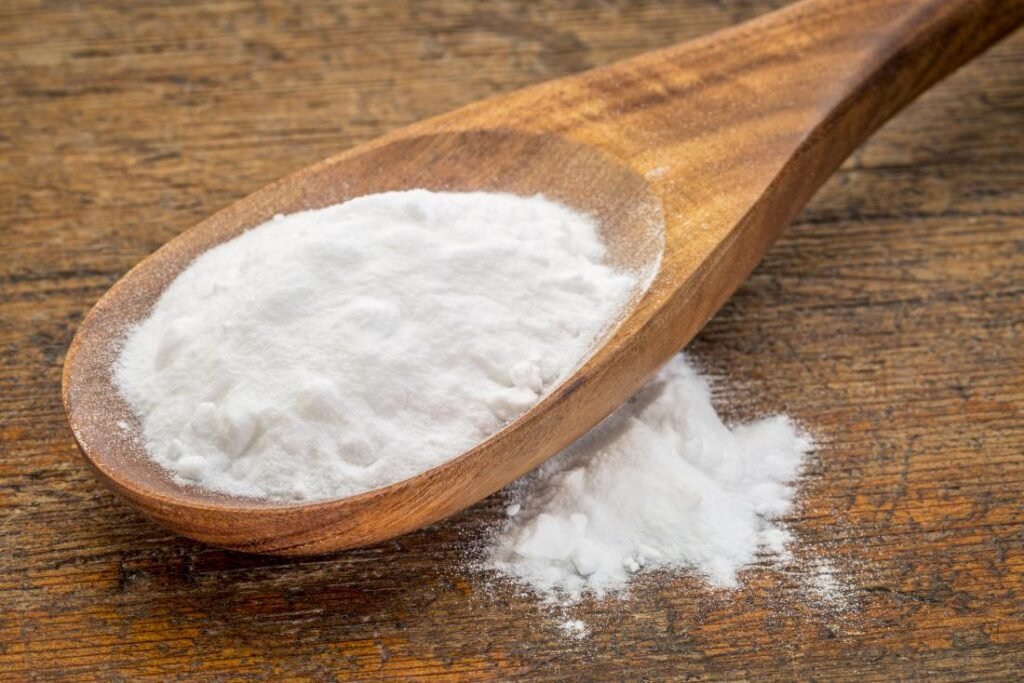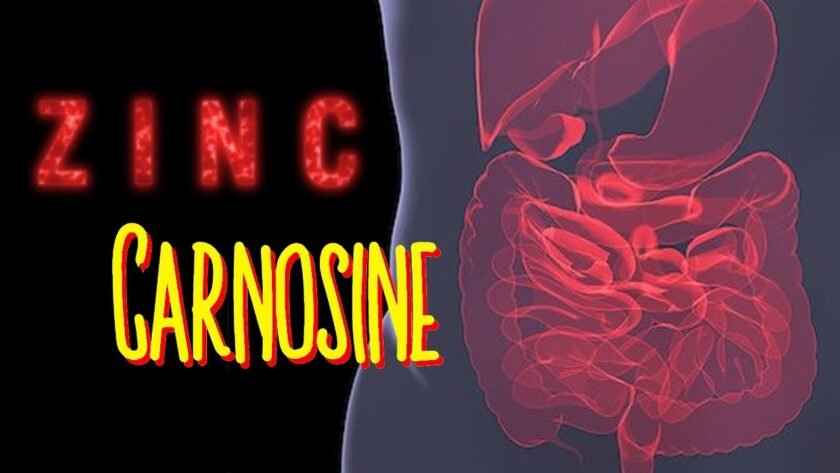Table of Contents
Move over antacids, there’s a new sheriff in town! Today, we’re diving into the science behind zinc carnosine—a powerful, yet surprisingly affordable natural remedy for ulcers and gastritis. Get ready to learn how it works and why it might be the answer you’ve been searching for.
Brief The Article:
The Problem with Conventional Ulcer Treatments:
- Antacids offer only temporary relief, failing to address the root causes of ulcers.
- While antibiotics target H. pylori bacteria, a common cause of ulcers, and H2 inhibitors reduce stomach acid, they might not be the most effective long-term solution.
Understanding Ulcers:
- Ulcers are not solely caused by excessive stomach acid, as previously thought. They often stem from a breakdown of the protective mucus lining in the stomach or small intestine, leading to open wounds and potential infections.
Zinc Carnosine: A Powerful Remedy
- Zinc carnosine is an effective, affordable, yet often overlooked treatment for ulcers.
- How it Works:
- It coats the stomach lining, protecting it from further damage.
- It breaks down into zinc and carnosine.
- Zinc inhibits the enzyme produced by H. pylori, reducing ammonia production, thereby promoting a more acidic stomach environment that’s unfavorable to the bacteria.
- Carnosine breaks down into histidine (a precursor to histamine, which helps regulate stomach acid) and beta-alanine (which increases carnosine levels for antioxidant and inflammation-reducing benefits).
- Zinc carnosine also has antibacterial properties and promotes mucus production, further strengthening the stomach’s protective barrier.
Beyond Ulcers:
- Zinc carnosine can be beneficial for people with genetic predispositions to ulcers and those with conditions like autism, restless leg syndrome (RLS), or tics.
Dosage and Additional Remedies:
- Recommended Dosage: 150 milligrams per day, divided into two doses, for 1 to 3 months.
- While zinc carnosine takes time to work, remedies like baking soda and liquid chlorophyll can offer immediate relief from pain and inflammation.
Key Takeaway:
Zinc carnosine is a promising and often underutilized treatment for ulcers and gastritis, offering a multifaceted approach that addresses the underlying causes, unlike conventional antacid-focused treatments. Its protective, antibacterial, and inflammation-reducing properties make it a powerful tool for promoting digestive health.
So let’s dive into the details…
How to fix stomach ulcers and gastritis

So today I went to the drugstore to look for an antacid. I wanted to see if they had a special remedy in that section and the remedy is zinc carnosine and I could not find it anywhere.
In fact, I couldn’t even find it under the vitamin section which is shocking because zinc carnosine is the cure for ulcers. That’s probably because it’s pretty cheap. I mean, I think it’s probably less than $10 a bottle.
So today I’m going to talk about the mechanism of why zinc carnosine fixes an ulcer and I have a lot of experience with this because in college I had severe heartburn and ulcers and I didn’t know what to do and I was suffering.
So what I did is I just took massive amounts of Tums which is chalk. 3 hours later started to hurt again and this cycle happened over and over and over.
Are conventional ulcer treatments effective?
Taking tons of antibiotics or antacids doesn’t really heal the problem. So the main treatment for an ulcer is an antibiotic. Why?
Because fairly recently they discovered that the cause of ulcers is a bacteria called H pylori but they also use an H2 inhibitor, H standing for histamine which I’m going to explain a little bit.
Causes of stomach problems
But I think most of the medical profession initially thought that an ulcer was really just too much acid, right? Well now we know it’s a breakdown of the mucus layer around part of your stomach or the small intestine and now you have this open wound and it can be infected.
How does zinc carnosine work?
Let’s break down this zinc carnosine. So when you take this zinc carnosine it’s a pretty stable compound that doesn’t really break down too easily
it kind of stays in the stomach and it kind of coats the area but it eventually breaks down into zinc and carnosine. Carnosine then breaks down into histidine. It’s the amino acid that turns into histamine.
Key Points
- Stable compound that coats the stomach
- Breaks down into zinc and carnosine
- Carnosine further breaks down into histidine
The role of histamine in stomach health

Now this is very confusing for a lot of people because when you think of histamines you think of an antihistamine, a medication that you use for allergies or mucus.
Histamine actually is released in the cells of the stomach that make hydrochloric acid and histamine helps regulate that hydrochloric acid. It actually helps increase that hydrochloric acid.
So when you take an H2 blocker you’re basically blocking the production of histamine and you’re lowering the amount of acid production in the stomach.
Helicobacter pylori—An ulcer-causing microbe

Now let me just switch gears to this H pylori. H pylori is in probably 80% of the population and it’s pretty harmless. It doesn’t really do anything until the environment in your stomach changes.
Then it starts to penetrate and create a hole in your stomach. What it does is it releases this enzyme to help increase more production of ammonia and so what this microbe is doing, it’s changing the pH of your stomach making it less acid and so it can survive, right? This is a survival mechanism.
So make mental note of that because when you lose the stomach acid you’re more susceptible to having H pylori infections. Now I wonder if that’s one reason why H pylori comes out of remission and creates damage in the first place.
Antimicrobial effects of zinc carnosine

But the significance of this is that zinc blocks the enzyme that H pylori is putting out there. It stops the production of ammonia so your stomach could be more acid.
So the combination of zinc stopping this ammonia production and this increase of histamine increasing more acid is automatically going to cause that microbe to go back in remission and stop creating a hole in your stomach. Zinc is also antibacterial and zinc also increases the production of that mucus in your stomach, that protective layer.
Benefits of Zinc Carnosine :
- Blocks H pylori enzyme
- Stops ammonia production
- Increases stomach acidity
- Has antibacterial properties
- Enhances protective mucus production
Importance of antioxidants for digestive health
Now I did mention that carnosine breaks down into two additional things. Okay, one being histidine which is the precursor for histamine but another one is called beta-alanine.
What does beta-alanine do? Well, it increases something called glutathione which is an antioxidant so it’s going to help reduce inflammation and it also supports the intestinal barrier.
So you can imagine this zinc carnosine is like the perfect remedy to do a lot of things to help heal an ulcer and decrease gastritis as well. Now there’s a couple other interesting things about zinc carnosine from a genetic standpoint.
There is a certain type of genetic defect via polymorphism which can put the person at risk for getting an ulcer. So if someone has an ulcer, autism, RS, or any tics I would also recommend zinc carnosine.
Best zinc carnosine dosage

Now how much zinc carnosine should you take? Well, I would recommend taking about 150 milligrams per day broken up into two times a day.
So you take 75 milligrams in the morning, 75 milligrams in the evening and that should be enough. You’d want to take that for about 1 to 3 months. However, it doesn’t work as fast as the medication.
Recommended Dosage:
- Total daily dose: 150 mg
- Morning dose: 75 mg
- Evening dose: 75 mg
- Duration: 1 to 3 months
Other natural remedies for gastritis

So what you might want to do is to use baking soda, okay, to kind of decrease the pain and there’s some other things you can do as well. You can take liquid chlorophyll on an empty stomach.
Chlorophyll is a great healer and it can definitely help not just with an ulcer but also if there’s irritation in your esophagus. It’ll just kind of go down and heal any type of lesions that you might have.
Summary
- When I was younger, I suffered severe heartburn and ulcers, and I used to take a lot of antacids. Those antacids only helped for a short amount of time, and my symptoms came back within a few hours. I wish I had known what I know now.
- It’s important to understand what causes ulcers and gastritis. For the longest time, it was believed that ulcers were a result of too much stomach acid. However, recent scientific evidence found that Helicobacter pylori (H. pylori) infection is the leading cause of peptic ulcer formation.
- While most people are exposed to these microbes, not everyone gets ulcers, as healthy stomach acid levels help destroy H. pylori and prevent infection and associated stomach issues.
- Taking antacids or histamine blockers to manage gastritis can increase the risk of infection as these drugs lower the stomach’s acidity, creating a perfect environment for H. Pylori to thrive.
- In contrast, zinc carnosine is a highly effective remedy that coats the stomach, increases stomach acid production, and stimulates the production of mucous lining the stomach wall.
- Zinc is also a potent antibacterial agent, directly inhibiting the growth of H. pylori, which helps prevent and manage ulcers and gastritis.
- Carnosine, on the other hand, is broken down and converted into superoxide dismutase (SOD), a powerful antioxidant that lowers inflammation. This explains why zinc carnosine is one of the best supplements to promote intestinal health.
- Consider taking 75 milligrams of zinc carnosine twice daily. Although zinc carnosine is highly effective, it doesn’t work immediately and should be taken for one to three months to see results. To find relief from stomach pain, natural remedies such as baking soda or liquid chlorophyll help soothe stomach irritation.
Additional-resources
FAQ
What is zinc carnosine used for?
Zinc carnosine is primarily used to support digestive health. Its main applications include:
- Promoting healing of stomach ulcers
- Reducing inflammation in the gastrointestinal tract
- Supporting the stomach lining and intestinal barrier
- Potentially alleviating symptoms of acid reflux and GERD
- Assisting in the treatment of gastritis
- Possibly aiding in the eradication of H. pylori bacteria
- Supporting overall gut health and function
Some research also suggests it may have antioxidant properties and support immune function.
Zinc carnosine side effects
While zinc carnosine is generally well-tolerated, some potential side effects may include:
- Nausea or stomach discomfort
- Headaches
- Dizziness
- Changes in taste perception
- Copper deficiency (with long-term, high-dose use)
Most side effects are mild and temporary. However, if you experience persistent or severe side effects, discontinue use and consult your healthcare provider. It’s important to stick to recommended dosages to minimize the risk of adverse effects.
Does zinc carnosine kill H pylori?
Zinc carnosine has shown promise in combating Helicobacter pylori (H. pylori) infections. While it may not completely eradicate H. pylori on its own, studies suggest that zinc carnosine can:
- Inhibit H. pylori growth and colonization
- Enhance the effectiveness of standard antibiotic treatments
- Reduce inflammation associated with H. pylori infection
- Support the stomach lining’s natural defense against the bacteria
When used in combination with conventional therapies, zinc carnosine may improve H. pylori eradication rates and reduce the risk of reinfection.
Zinc carnosine dosage for gastritis
The typical recommended dosage of zinc carnosine for gastritis is 75-150 mg twice daily. However, optimal dosage may vary depending on the severity of gastritis and individual factors. It’s best to start with a lower dose and gradually increase if needed. Always follow the instructions on the product label or consult with a healthcare professional for personalized dosage recommendations. Treatment duration may range from a few weeks to several months, depending on symptom improvement and your doctor’s advice.
How long does it take for zinc carnosine to work?
The time it takes for zinc carnosine to work can vary depending on the individual and the condition being treated. Some people may notice improvements in digestive symptoms within a few days to a week of starting supplementation. However, for more significant effects, such as healing of stomach ulcers or reducing gastritis symptoms, it may take 4-8 weeks of consistent use. For optimal results, it’s recommended to continue use for at least 8-12 weeks, or as advised by your healthcare provider. Patience and consistency are key when using zinc carnosine for digestive health.
Zinc carnosine gastritis
Zinc carnosine has shown promising results in the treatment of gastritis. It works by:
- Reducing inflammation in the stomach lining
- Promoting the healing of damaged gastric mucosa
- Strengthening the stomach’s protective barrier
- Potentially inhibiting H. pylori growth, a common cause of gastritis
Studies have demonstrated that zinc carnosine can help alleviate gastritis symptoms such as stomach pain, bloating, and nausea. It may be particularly beneficial for erosive gastritis and can be used alongside other treatments prescribed by your doctor.
Zinc carnosine benefits
Zinc carnosine offers numerous potential benefits for digestive and overall health:
- Supports stomach lining integrity
- Promotes healing of gastric and intestinal ulcers
- Reduces inflammation in the gastrointestinal tract
- May help alleviate symptoms of acid reflux and GERD
- Supports treatment of gastritis
- Potentially aids in H. pylori eradication
- Enhances mucosal protection in the stomach and small intestine
- May support immune function
- Possesses antioxidant properties
- Could improve nutrient absorption by supporting gut health
These benefits make zinc carnosine a valuable supplement for those seeking to improve their digestive health and overall well-being.
Zinc carnosine H pylori
Zinc carnosine has shown promise in addressing H. pylori infections:
- It may inhibit H. pylori growth and colonization in the stomach
- Can enhance the effectiveness of standard antibiotic treatments for H. pylori
- Helps reduce inflammation associated with H. pylori infection
- Supports the stomach lining’s natural defense mechanisms
- May lower the risk of H. pylori-related complications
While zinc carnosine alone may not completely eradicate H. pylori, it can be a valuable adjunct to conventional treatments. Some studies suggest that adding zinc carnosine to standard H. pylori eradication therapy may improve success rates and reduce the likelihood of reinfection.
Take zinc carnosine on empty stomach
Zinc carnosine can be taken on an empty stomach or with food. Some key points to consider:
- Taking it on an empty stomach may enhance absorption for some individuals
- However, if you experience any stomach discomfort, taking it with food can help alleviate this issue
- Consistency is more important than timing – choose a method that works best for you and stick to it
- If taking multiple supplements, consult with a healthcare provider about optimal timing
- Avoid taking zinc carnosine with foods high in phytates (like whole grains and legumes), as these can interfere with zinc absorption
- For best results, take zinc carnosine at least 2 hours apart from any medications, unless otherwise advised by your doctor
Ultimately, the most important factor is to take zinc carnosine regularly as recommended to experience its potential benefits for digestive health.




